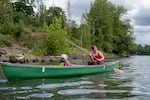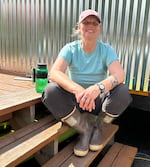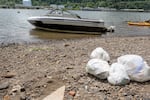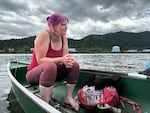
Rebecca Van Zandt fishes from a canoe with her two dogs on the Willamette River in Portland, Ore., on May 29, 2024.
April Ehrlich / OPB
On a cloudy late May afternoon, Rebecca Van Zandt’s fishing line snagged on something, dragging beneath her canoe.
“Am I stuck or do I got a fish? Nope, I’m stuck. That’s all right,” she said with a resigned shrug, settling back into the boat with her two dogs.
Van Zandt was trying to catch something to eat from the Willamette River in North Portland before the sun set. She has been living along the river for eight years. Lately, it’s been getting crowded.
“There’s a lot more people living out here,” she said. “More and more every day. People not knowing where to go.”
More people have brought more trash. A grocery cart bobbing near the shore. Sandy clothes and food wrappers strewn across the beach. Van Zandt tries to compost or burn what she can: “I believe in pack it in, pack it out.” But it’s hard to throw anything away without trash cans nearby.
Over the last few years, environmental groups have been pulling out mounds of garbage from the Willamette River from Eugene up through Portland, a worsening problem that they tie to homeless encampments. It’s gotten so bad, Oregon could propose regulations that would require riverside cities, counties and private landowners to remove trash from the river.
Homeless advocates and researchers say the mounting river trash is a direct result of homeless camp removals in urban areas. Like many cities, Portland has recently cracked down on public camping, mostly in residential and commercial neighborhoods. Those removals appear to be pushing people into remote wild areas, spurring environmental hazards like mounting trash and sporadic fires. Some spots are tucked so deep into the woods that they are only accessible by boat or unmarked trails, leaving the people living there alone, and far from help.

A shopping cart bobs near the shore of the Willamette River in Portland, Ore., on May 29, 2024.
April Ehrlich / OPB
Trash services could help. So would more housing
In 2020, San Diego University researchers Shawn Flanigan and Megan Welsh interviewed about 80 people experiencing homelessness to understand why people camp near San Diego waterways. They concluded that people were driven to the river by local homeless policies, including arrests and forced camp removals.
At the start of the COVID-19 pandemic, the number of people experiencing homelessness across the country briefly declined, and many cities like Portland temporarily paused enforcing camping bans. As federal funds for rent forgiveness and eviction deferrals ran dry, more people started lining city streets with tents and campers. Multnomah County counted about 6,300 homeless people last year — a 57% increase from 2019.
The increased visibility of homelessness has outraged business owners and housed people. Starting around 2022, Portland politicians ushered in a string of public camping bans, ultimately leaving few places where people can sleep in a city where shelters are chronically full.
“The city did a pretty dramatic change over the last year, moving to more and more encampment removals,” said Portland State University land-use professor Marisa Zapata, who also leads the university’s Homelessness Research & Action Collaborative.
According to city data, Portland removed over 6,100 camps this past year — twice as many as the year before the pandemic. Zapata expects that number to increase as Portland’s latest camping restrictions take effect. That will push more people into areas where they are less visible and where there are fewer resources like food, clean water, health care — and trash services.
She said daily trash pickups near encampments could help, but the most effective solution would be addressing Oregon’s extreme housing shortage.
“If we actually just tried to house people faster, it would end the issue altogether,” Zapata said.
Grassroots groups lead cleaning efforts

Zora Hess sits on a stairwell at Green Anchors, an industrial collective on the Willamette River in Portland, Ore., on May 29, 2024.
April Ehrlich / OPB
Clearing trash from Oregon’s rivers usually falls to a hodgepodge of nonprofit organizations and volunteers. Among those volunteers is Zora Hess, who uses a kayak to fish out trash from around the Willamette River and the Columbia Slough in North Portland.
“My whole goal is no more cleanups,” Hess said. “I cannot tell you how many times I find [trash] — mostly plastic — and it’s been nibbled on by fish and birds.”
Hess is a little different than other river cleaners. She uses her time clearing trash to connect with people who are living outside and offers help. Sometimes it’s food and water, sometimes it’s pulling together funds for temporary dumpsters.
During one of her kayak outings in May, Hess met a man named Peter living out of an old boat with his dog. He sat on a dock next to a plastic bag full of cans and bottles. She asked him if he needed anything. He said he needed two things: food and water.
“I’ve got one bag of dog food,” he said. “I make sure that dog’s fed first.”
Hess later approached a beachside camp that appeared empty. She pointed to bags of trash.
“There are so many unhoused people cleaning up the trash here, but then there are no trash cans. They cannot put it anywhere,” Hess said.

A man who asked to go by Peter sits on a dock near his boat, where he has been living, in Portland, Ore., on May 29, 2024.
April Ehrlich / OPB
Then there’s the illegal dumping. Hess often finds piles of construction materials, like drywall and broken windows, on the Willamette’s banks. Similar construction piles have appeared near homeless encampments within the city.
People can report illegal dumping to Metro, the tri-county government agency for the Portland area. According to its data, about a quarter of the trash it collects throughout the region comes from homeless encampments. But almost twice as much comes from residences — like couches, broken fridges and old mattresses. Metro officials say illegal dumping has increased across the board since the pandemic. Officials say some could be coming from homes that can’t afford their trash bills on top of the increasing costs of food, housing and other utilities. People look for other ways to discard their trash for free, whether in an open dumpster or a homeless encampment.
Portland used to make public dumpsters available around the city, which were intended as a resource for people experiencing homelessness. But the city has phased out that service in recent years after other people kept dumping their household garbage.
“Yeah, people use them, that’s what trash cans are for,” Hess said while standing on a riverside beach. “There are always going to be people who are misusing the system. But you cannot punish everybody.”

Bags of trash sit near an encampment and a boat on the Willamette River in Portland, Ore., on May 29, 2024.
April Ehrlich / OPB
Isolated and alone by the river
Some nonprofit groups provide other types of trash services to homeless camps. Ground Score, which contracts with Portland to collect trash around the city, employs homeless and housing-insecure people as “waste pickers.” Much of the trash they collect is then reused or recycled.
“Ground Score’s mission is to change society’s perception of who and what is considered valuable,” co-founder and co-director Barbie Weber said.
Most of its staff have been homeless at one point, including Weber, who used to camp along the Willamette River. She said waterways offer people a sense of peace and refuge from the constant threat of camp removals, but they’re not safe places for people to sleep.
In December, a homeless man drowned in Johnson Creek after it flooded during heavy rain. Some people die just from being far away from medical help. People can get sick from being exposed to human waste, or from drinking from the river during a seasonal algae bloom. A 10-mile stretch of the Willamette River between the Broadway Bridge and Sauvie Island is a federal superfund site because of industrial pollution. People camping in Willamette Cove are potentially exposed to heavy metals, diesel fuel and other toxics. The isolation also makes people vulnerable to robbery and assaults.
But camp removals are so jarring that people are willing to take those risks.
“You don’t have any housed neighbors you’re bothering, there’s no businesses you’re bothering there,” Weber said. “There, the only thing you’re taking into risk is your own health.”

Rebecca Van Zandt fishes from a canoe on the Willamette River in Portland, Ore., on May 29, 2024.
April Ehrlich / OPB
The emotional toll of camp sweeps
Back on the Willamette River, Rebecca Van Zandt’s dogs got restless as she tugged at her fishing line.
Although life by the river is rough, she said, it’s better than being forced to move her camp every few days. Having police suddenly raid your home is scary, and you’re forced to collect whatever you can carry. The rest gets bagged and taken to a storage facility. It can be difficult for people to retrieve these items later. It eventually gets thrown away.
As she looked down into her row boat, she said her uncle died in December from a heart attack shortly after police evicted his camp. He was one of her few relatives nearby, someone she could confide in. He promised he would one day tell her more about her family history. Now he’ll never get that chance.
She blames his death on stress from having his camp evicted.
“He was my close uncle,” she recalled, her voice cracking. “But he’s in a better place now. At least I know that much.”
For Van Zandt, reflecting on this loss, the issue framed as “river trash” is bigger than the food wrappers she doesn’t know what to do with. It’s the humiliation of having her well-being, and that of others — their ability to merely exist — so easily disregarded by housed people. Like their weekly trash pickup, they don’t care where it goes, as long as it’s someplace far and unseen.
